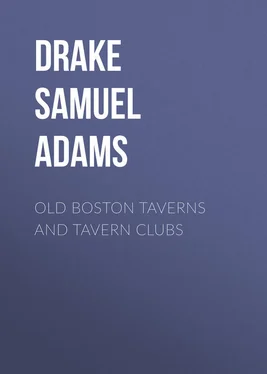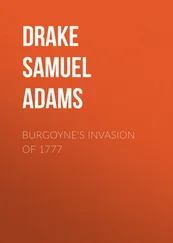Samuel Drake - Old Boston Taverns and Tavern Clubs
Здесь есть возможность читать онлайн «Samuel Drake - Old Boston Taverns and Tavern Clubs» — ознакомительный отрывок электронной книги совершенно бесплатно, а после прочтения отрывка купить полную версию. В некоторых случаях можно слушать аудио, скачать через торрент в формате fb2 и присутствует краткое содержание. Жанр: foreign_antique, foreign_prose, на английском языке. Описание произведения, (предисловие) а так же отзывы посетителей доступны на портале библиотеки ЛибКат.
- Название:Old Boston Taverns and Tavern Clubs
- Автор:
- Жанр:
- Год:неизвестен
- ISBN:нет данных
- Рейтинг книги:4 / 5. Голосов: 1
-
Избранное:Добавить в избранное
- Отзывы:
-
Ваша оценка:
- 80
- 1
- 2
- 3
- 4
- 5
Old Boston Taverns and Tavern Clubs: краткое содержание, описание и аннотация
Предлагаем к чтению аннотацию, описание, краткое содержание или предисловие (зависит от того, что написал сам автор книги «Old Boston Taverns and Tavern Clubs»). Если вы не нашли необходимую информацию о книге — напишите в комментариях, мы постараемся отыскать её.
Old Boston Taverns and Tavern Clubs — читать онлайн ознакомительный отрывок
Ниже представлен текст книги, разбитый по страницам. Система сохранения места последней прочитанной страницы, позволяет с удобством читать онлайн бесплатно книгу «Old Boston Taverns and Tavern Clubs», без необходимости каждый раз заново искать на чём Вы остановились. Поставьте закладку, и сможете в любой момент перейти на страницу, на которой закончили чтение.
Интервал:
Закладка:
After the burning of the town-house, near by, in the winter of 1747, had turned the General Court out of doors, that body finished its sessions at Vardy’s; nor do we find any record of legislation touching Luke’s taproom on that occasion.
Vardy’s was the resort of the young bloods of the town, who spent their evenings in drinking, gaming, or recounting their love affairs. One July evening, in 1728, two young men belonging to the first families in the province quarreled over their cards or wine. A challenge passed. At that time the sword was the weapon of gentlemen. The parties repaired to a secluded part of the Common, stripped for the encounter, and fought it out by the light of the moon. After a few passes one of the combatants, named Woodbridge, received a mortal thrust; the survivor was hurried off by his friends on board a ship, which immediately set sail. This being the first duel ever fought in the town, it naturally made a great stir.
“Where’s honest Luke , – that cook from London?
For without Luke the Lodge is undone;
’Twas he who oft dispelled their sadness.
And fill’d the Brethren’s heart with gladness.
For them his ample bowls o’erflow’d.
His table groan’d beneath its load;
For them he stretch’d his utmost art. —
Their honours grateful they impart.
Luke in return is made a brother ,
As good and true as any other;
And still, though broke with age and wine,
Preserves the token and the sign .”
We cannot leave the neighborhood without at least making mention of the Massacre of the 5th of March, 1770, which took place in front of the tavern. It was then a three-story brick house, the successor, it is believed, of the first building erected on the spot and destroyed in the great fire of 1711. On the opposite corner of the lane stood the Royal Custom House, where a sentry was walking his lonely round on that frosty night, little dreaming of the part he was to play in the coming tragedy. With the assault made by the mob on this sentinel, the fatal affray began which sealed the cause of the colonists with their blood. At this time the tavern enjoyed the patronage of the newly arrived British officers of the army and navy as well as of citizens or placemen, of the Tory party, so that its inmates must have witnessed, with peculiar feelings, every incident of that night of terror. Consequently the house with its sign is shown in Revere’s well-known picture of the massacre.
One more old hostelry in this vicinity merits a word from us. Though not going so far back or coming down to so late a date as some of the houses already mentioned, nevertheless it has ample claim not to be passed by in silence.
The Anchor, otherwise the “Blew Anchor,” stood on the ground now occupied by the Globe newspaper building. In early times it divided with the State’s Arms the patronage of the magistrates, who seem to have had a custom, perhaps not yet quite out of date, of adjourning to the ordinary over the way after transacting the business which had brought them together. So we find that the commissioners of the United Colonies, and even the reverend clergy, when they were summoned to the colonial capital to attend a synod, were usually entertained here at the Anchor .
This fact presupposes a house having what we should now call the latest improvements, or at least possessing some advantages over its older rivals in the excellence of its table or cellarage. When Robert Turner kept it, his rooms were distinguished, after the manner of the old London inns, as the Cross Keys, Green Dragon, Anchor and Castle Chamber, Rose and Sun, Low Room, so making old associations bring in custom.
It was in 1686 that John Dunton, a London bookseller whom Pope lampoons in the “Dunciad,” came over to Boston to do a little business in the bookselling line. The vicinity of the town-house was then crowded with book-shops, all of which drove a thriving trade in printing and selling sermons, almanacs, or fugitive essays of a sort now quite unknown outside of a few eager collectors. The time was a critical one in New England, as she was feeling the tremor of the coming revolt which sent King James into exile; yet to read Dunton’s account of men and things as he thought he saw them, one would imagine him just dropped into Arcadia, rather than breathing the threatening atmosphere of a country that was tottering on the edge of revolution.
But it is to him, at any rate, that we are indebted for a portrait of the typical landlord, – one whom we feel at once we should like to have known, and, having known, to cherish in our memory. With a flourish of his goose-quill Dunton introduces us to George Monk, landlord of the Anchor , who, somehow, reminds us of Chaucer’s Harry Bailly, and Ben Jonson’s Goodstock. And we more than suspect from what follows that Dunton had tasted the “Anchor” Madeira, not only once, but again.
George Monk, mine host of the Anchor , Dunton tells us, was “a person so remarkable that, had I not been acquainted with him, it would be a hard matter to make any New England man believe that I had been in Boston; for there was no one house in all the town more noted, or where a man might meet with better accommodation. Besides he was a brisk and jolly man, whose conversation was coveted by all his guests as the life and spirit of the company.”
In this off-hand sketch we behold the traditional publican, now, alas! extinct. Gossip, newsmonger, banker, pawnbroker, expediter of men or effects, the intimate association so long existing between landlord and public under the old régime everywhere brought about a still closer one among the guild itself, so establishing a network of communication coextensive with all the great routes from Maine to Georgia.
Situated just “around the corner” from the council-chamber, the Anchor became, as we have seen, the favorite haunt of members of the government, and so acquired something of an official character and standing. We have strong reason to believe that, under the mellowing influence of the punch-bowl, those antique men of iron mould and mien could now and then crack a grim jest or tell a story or possibly troll a love-ditty, with grave gusto. At any rate, we find Chief Justice Sewall jotting down in his “Diary” the familiar sentence, “The deputies treated and I treated.” And, to tell the truth, we would much prefer to think of the colonial fathers as possessing even some human frailties rather than as the statues now replacing their living forms and features in our streets.
But now and then we can imagine the noise of great merriment making the very windows of some of these old hostelries rattle again. We learn that the Greyhoundwas a respectable public house, situated in Roxbury, and of very early date too; for the venerable and saintly Eliot lived upon one side and his pious colleague, Samuel Danforth, on the other. Yet notwithstanding its being, as it were, hedged in between two such eminent pillars of the church, the godly Danforth bitterly complains of the provocation which frequenters of the tavern sometimes tried him withal, and naïvely informs us that, when from his study windows he saw any of the town dwellers loitering there he would go down and “chide them away.”
It is related in the memoirs of the celebrated Indian fighter, Captain Benjamin Church, that he and Captain Converse once found themselves in the neighborhood of a tavern at the South End of Boston. As old comrades they wished to go in and take a parting glass together; but, on searching their pockets, Church could find only sixpence and Converse not a penny to bless himself with, so they were compelled to forego this pledge of friendship and part with thirsty lips. Going on to Roxbury, Church luckily found an old neighbor of his, who generously lent him money enough to get home with. He tells the anecdote in order to show to what straits the parsimony of the Massachusetts rulers had reduced him, their great captain, to whom the colony owed so much.
Читать дальшеИнтервал:
Закладка:
Похожие книги на «Old Boston Taverns and Tavern Clubs»
Представляем Вашему вниманию похожие книги на «Old Boston Taverns and Tavern Clubs» списком для выбора. Мы отобрали схожую по названию и смыслу литературу в надежде предоставить читателям больше вариантов отыскать новые, интересные, ещё непрочитанные произведения.
Обсуждение, отзывы о книге «Old Boston Taverns and Tavern Clubs» и просто собственные мнения читателей. Оставьте ваши комментарии, напишите, что Вы думаете о произведении, его смысле или главных героях. Укажите что конкретно понравилось, а что нет, и почему Вы так считаете.












